How Ottawa Spends
From 1998 to 2019, How Ottawa Spends provided an annual review of the federal government’s spending and public policy by the Carleton University School of Public Policy and Administration. From 2015 to 2019, How Ottawa Spends was published in complimentary, digital formats.
How Ottawa Spends has ceased publication. Please find latest publication, How Ottawa Spends, 2018-2019: Next? Edited by Katherine Graham, and Allan Maslove, as well as and all previous issues, below.
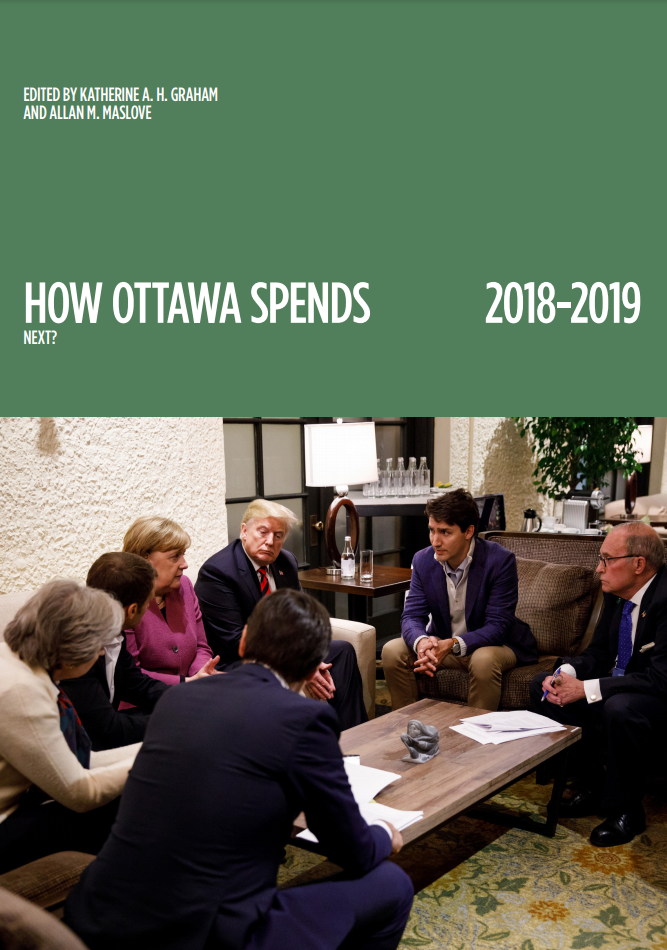
How Ottawa Spends, 2018-2019: Next?
Edited by Katherine Graham and Allan Maslove
Read online.
Recommended Citation: Graham, Katherine A.H. and Allan M. Maslove. How Ottawa Spends, 2018-2019: Next? Ottawa, ON: Carleton University, School of Public Policy and Administration, 2018. DOI: http://doi.org/10.22215/hos/2018-19
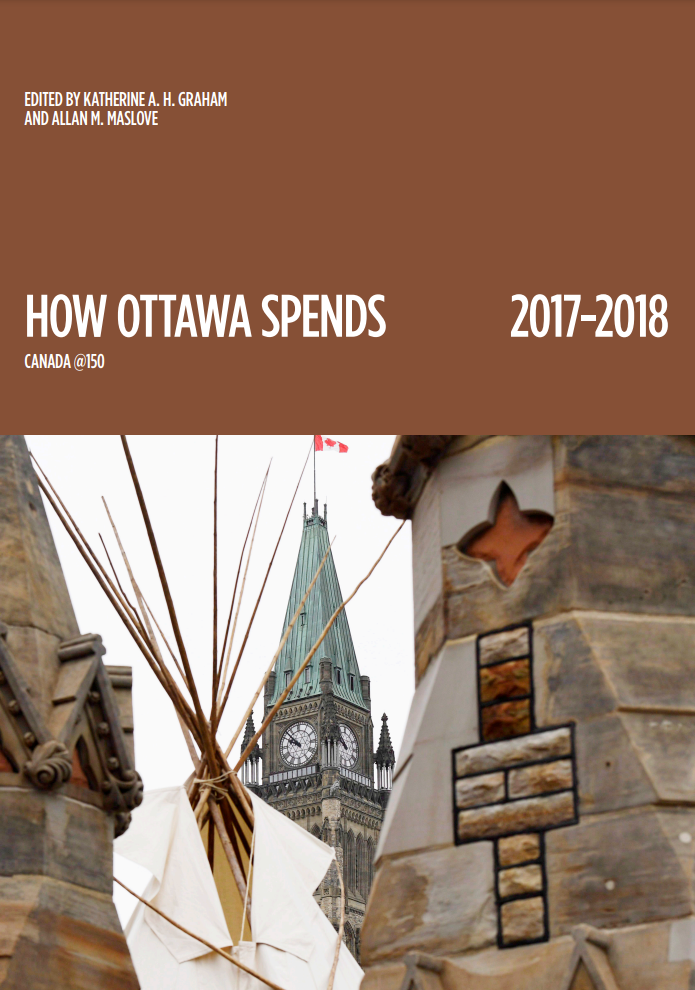
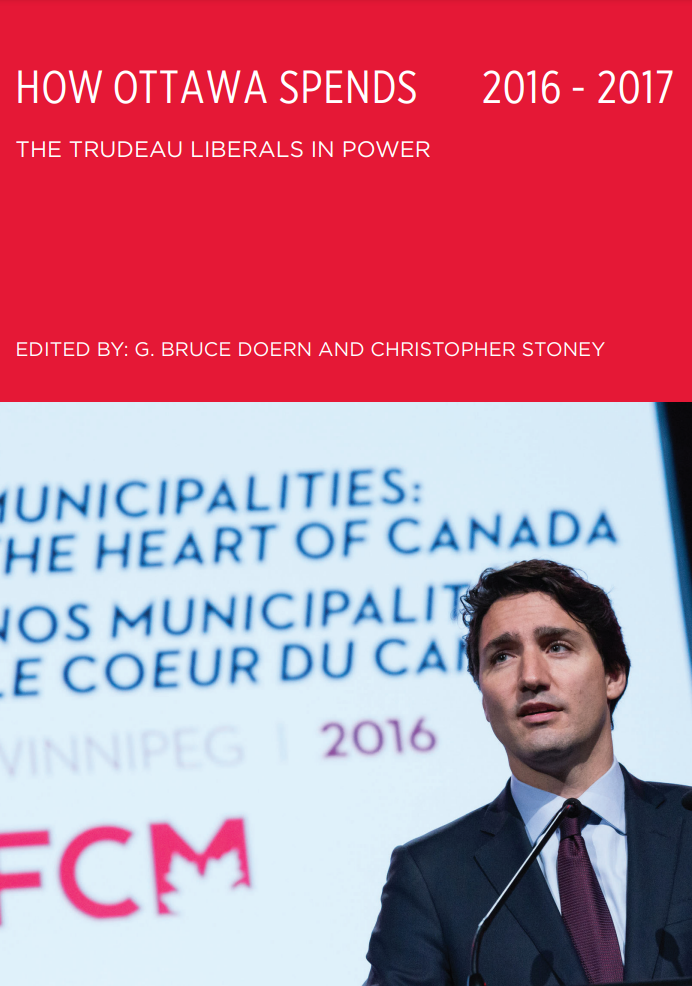
How Ottawa Spends 2016 – 2017: The Trudeau Liberals in Power
Edited by G. Bruce Doern and Christopher Stoney
Ottawa, ON, CA: Institute of Fiscal Studies and Democracy
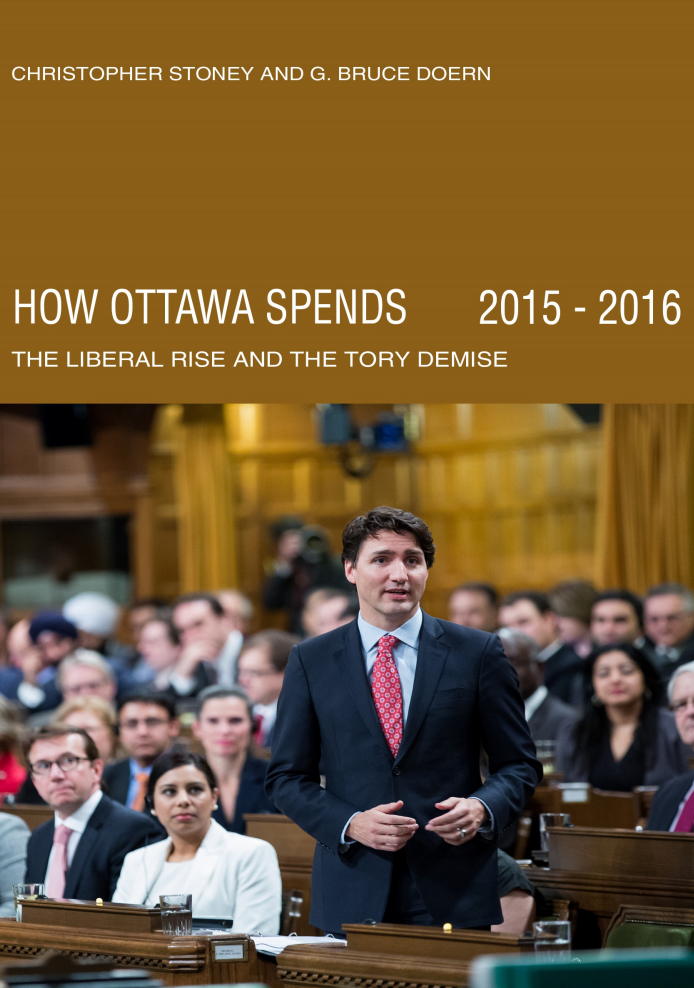
How Ottawa Spends: The Liberal Rise and the Tory Demise 2015-2016
Edited by Christopher Stoney and G. Bruce Doern
Read online.
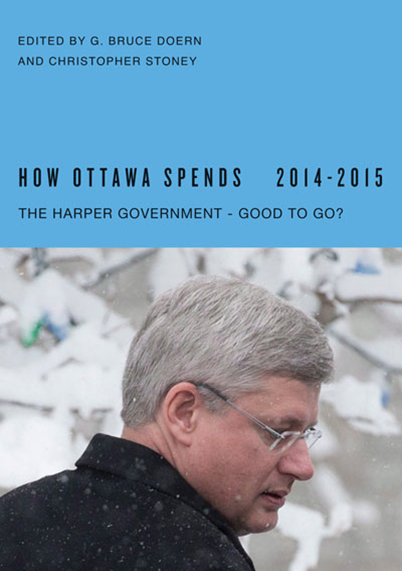
How Ottawa Spends 2014-2015: The Harper Government: Good to Go?
Edited by G. Bruce Doern and Christopher Stoney
The 2014-15 edition of How Ottawa Spends critically examines national politics and related fiscal, economic, and social priorities and policies, with an emphasis on the now long-running Harper-linked Senate scandal and the serious challenges to Harper’s leadership and controlling style of attack politics.
Contributors from across Canada examine the Conservative government agenda both in terms of its macroeconomic fiscal policy and electoral success since 2006 and also as it plans for a 2015 electoral victory with the aid of a healthy surplus budgetary war chest. Individual chapters examine several closely linked political, policy, and spending realms including the growing strength and nature of the Justin Trudeau-led Liberal Party challenge, the 2014 Harper Economic Action Plan, the demise of federal environmental policy under Harper’s responsible resource development strategy, the Conservative’s crime and punishment agenda, the growing evidence regarding the federal government’s muzzling of scientists and evidence in federal policy formation, and the now five-year story of the Harper creation, treatment, and role of the Parliamentary Budget Officer.
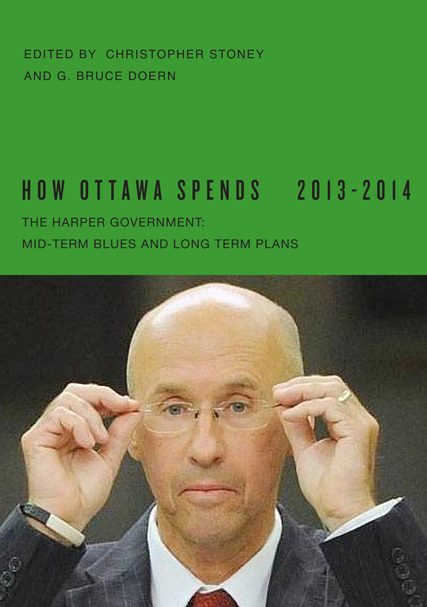
How Ottawa Spends 2013-14: The Harper Government: Mid-term Blues and Long-term Plans
Edited by Christopher Stoney and G. Bruce Doern
The 2013-14 edition of How Ottawa Spends critically examines national politics, priorities, and policies with a close lens on Stephen Harper’s Conservative party during the middle of their first term as a majority.
Contributors from across Canada examine the federal government and it’s not uncommon mid-term problems but also its considerable agenda of long-term plans, both set in the midst of national economic fragility and a global fiscal and debt crisis. Individual chapters examine several related political, policy, and spending realms including the Budget Action Plan, the ten-year Canada Health Transfer Plan, the Canada Pension Plan, and Old Age Security reforms. The contributors also consider austerity related public sector downsizing and strategic spending reviews, national energy, and related environmental strategies, and the growing Harper practice of “one-off” federalism.
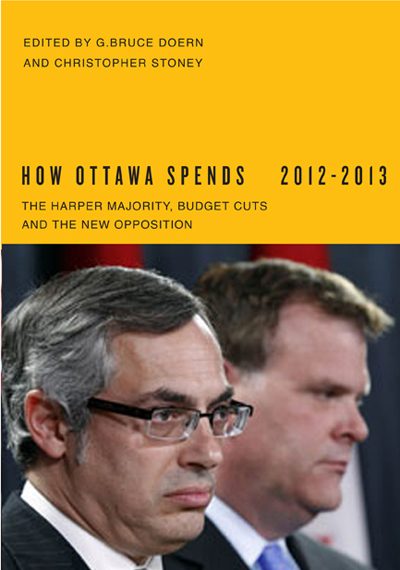
How Ottawa Spends 2012-13, ‘The Harper Majority, Budget Cuts, and the New Opposition’
Edited by G. Bruce Doern and Christopher Stoney
Continuing its tradition of current, exemplary scholarship, the 2012-13 edition of How Ottawa Spends casts a critical eye at national politics, priorities, and policies, with an emphasis on the Conservative majority’s mandated austerity measures and budget-cutting strategies.
Leading scholars from across Canada examine a new era of majority government and a transformed political opposition both in Parliament and in provincial politics. Several closely linked political, policy, and spending realms are examined, including corporate tax reform, Conservative Party social policy, regional economic development, science and technology investments, Canada-US perimeter security and trade agreements, the rise and fall of regulatory regimes, and Canadian health care. Related governance issues such as federal infrastructure program impacts, the Harper government’s Economic Action Plan impacts in Ontario, and community colleges in the federal innovation agenda, are also discussed in detail.
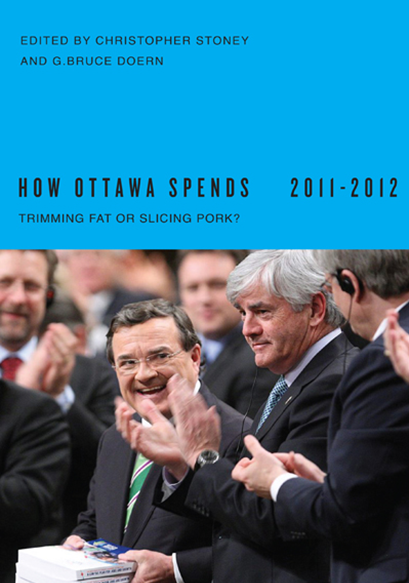
How Ottawa Spends 2011-12, “Trimming Fat or Slicing Pork”
Edited by Christopher Stoney and G. Bruce Doern
Continuing its tradition of timely and exemplary scholarship, the 2011-2012 edition of How Ottawa Spends examines national politics, priorities, and policies, with an emphasis on the austerity measures and budget cutting strategy of the Harper Conservative government; it also includes an analysis of the outcome of the federal election in May 2011.
Leading scholars from across Canada examine a new era of “life under the knife” in the context of the Harper agenda after five years in power, the partisan calculus of a minority Parliament, and a deep global recession still in crisis mode. Given the budget-related pressure for an election, the book poses questions about the degree to which the budget agenda involves the political arts of “trimming fat” versus “slicing the pork” of partisan spending. Several closely linked political, policy, and spending realms are examined, including economic stimulus, environmental assessment, energy and climate change, health care, science and technology, immigration, and northern strategy (including affordable housing). Related governance issues such as the use of new media, regulatory budget cuts, Industry Canada as an economic regulator, and federal compensation costs are also discussed in detail.
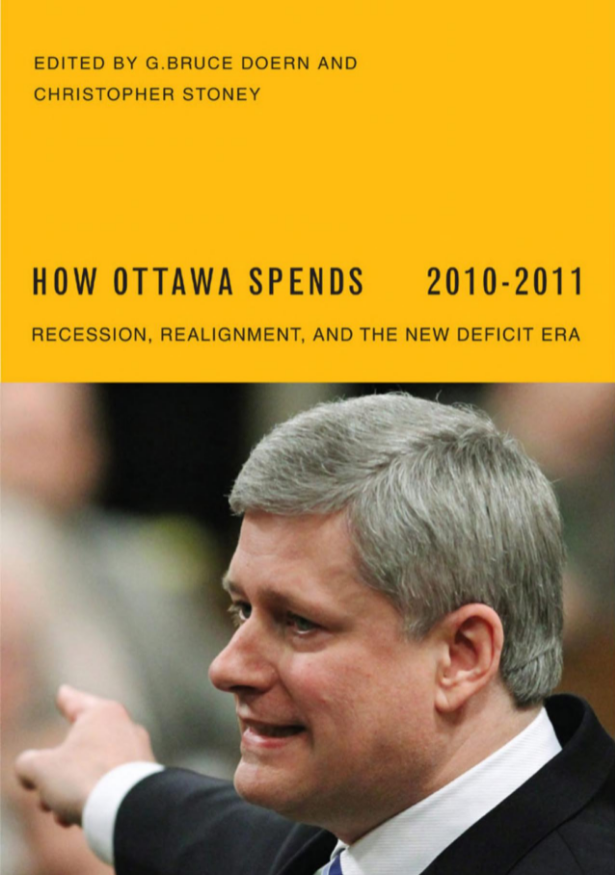
How Ottawa Spends 2010-2011, ‘Reform and Realignment in a time of Crisis’
Edited by G. Bruce Doern and Christopher Stoney
Continuing the excellent standards and traditions of timely scholarship, the 2010-2011 edition of How Ottawa Spends critically examines national politics, priorities, and policies with emphasis on federal economic and social spending. Given the political and budgetary challenges posed by the recession, this year’s instalment pays close attention to the growing fiscal deficit.
Informed authors from across Canada examine recession-related policy fields, including the Canadian banking system, new industrial policy pressures such as the automotive industry bailout, policies in science, technology, and innovation, and suggestions about how to resist the United States’ “buy America” trade policies. The chapters in this volume also consider Canada’s national, regional, and political divisiveness, the impact of the dynamic Obama Administration on Canadian domestic affairs, and governance during a time of minority government.
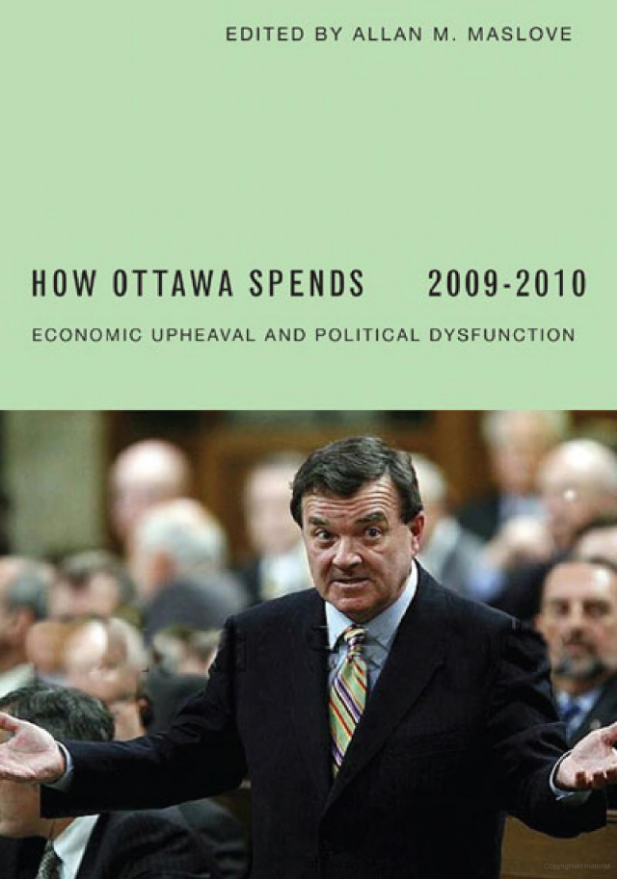
How Ottawa Spends, 2009-2010: Economic Upheaval and Political Dysfunction
Edited by Allan M. Maslove
Early Harper budgets and the promises not kept in a beleaguered economy spiralling towards recession.
…
This is the thirtieth volume in the series How Ottawa Spends. It is arguable that never in these years have Canadians faced such serious economic upheaval and political dysfunction as the current climate. The dramatic and seemingly sudden changes in the economy occurred simultaneously with a political drama – one that was largely disassociated from the real and pressing economic challenge.
Early Harper budgets delivered lower taxes for all Canadians partly through highly targeted but politically noticeable small tax breaks on textbooks for students, tools for apprentices in skilled trades, and public transit costs. The needs of the beleaguered average Canadian and the “swing voter in the swing constituencies” of an already strategized “next” election were a key part of Conservative agenda-setting. In the 2007 budget alone there were twenty-nine separate tax reductions and federal spending was projected to increase by $10 billion, including a 5.7 percent increase in program spending. A small surplus of $3.3 billion was planned, almost all of which would go to debt reduction. As Harper savoured his 14 October 2008 re-election with a strengthened minority government, although without his desired majority, he and his minister of Finance already knew that his surpluses were likely gone in the face of the crashing financial sector and a looming recession. Future deficits were firmly back on the agenda.
Contributors include Malcolm G. Bird (Carleton University), Chris Brown (Carleton University), G. Bruce Doern (Carleton University and University of Exeter), Melissa Haussman (Carleton University), Robert Hilton (Carleton University), Ruth Hubbard (University of Ottawa), Edward T. Jackson (Carleton University), Kirsten Kozolanka (Carleton University), Evert Lindquist (University of Victoria), Allan M. Maslove (Carleton University), Peter Nares (Social and Enterprise Development Innovations), Gilles Paquet (University of Ottawa), L. Pauline Rankin (Carleton University), Jennifer Robson (Carleton University), Robert P. Shepherd (Carleton University), Richard Shillington (Informetrica Limited), and Chris Stoney (Carleton University).
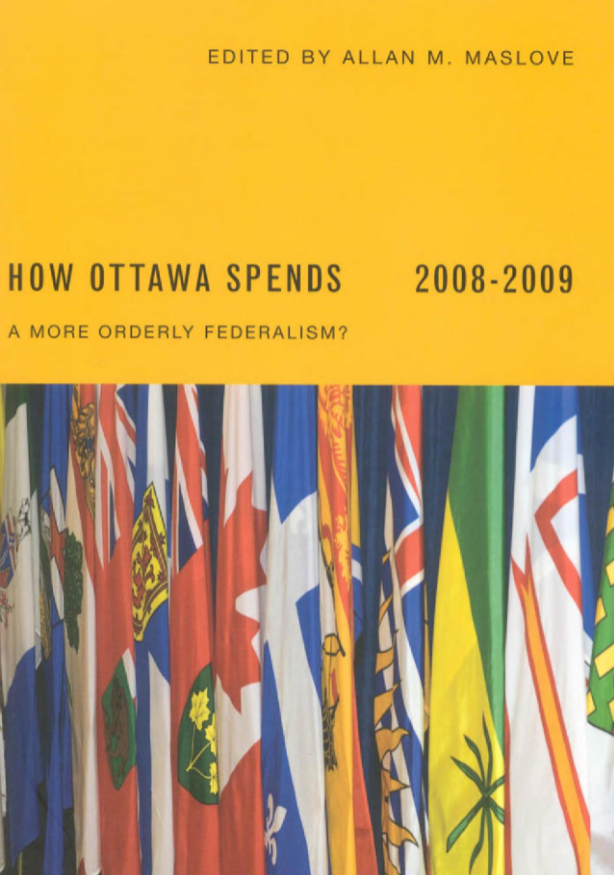
How Ottawa Spends, 2008-2009: A More Orderly Federalism?
Edited by Allan M. Maslove
Analysing the Harper government’s agenda in the context of changing federal-provincial relations.
The twenty-ninth edition of How Ottawa Spends focuses on the policies of the Harper government and the course of federal-provincial relations. Leading scholars of Canadian public policy explore several key policy areas, including fiscal balance in the federation, tax policy, regulatory capacity, the federal funding of territorial and northern Aboriginal governments, childcare policy, higher education policy, telecommunications policy, and the rapid appearance and disappearance of the federal social economy initiative – i.e., “how Ottawa doesn’t spend.”
Contributors include Frances Abele (Carleton & IRPP), Cheryl N. Collier (Carleton), Geoffrey Hale (University of Lethbridge), Walter Hettich (emeritus, California State), Edward T. Jackson (Carleton), Rianne Mahon (Carleton), Allan M. Maslove (Carleton), Clara Morgan (Carleton), Michael J. Prince (University of Victoria), Richard Schultz (McGill), Robert Slater (Carleton), Barry Stemshorn (University of Ottawa), and Stanley L. Winer (Carleton).
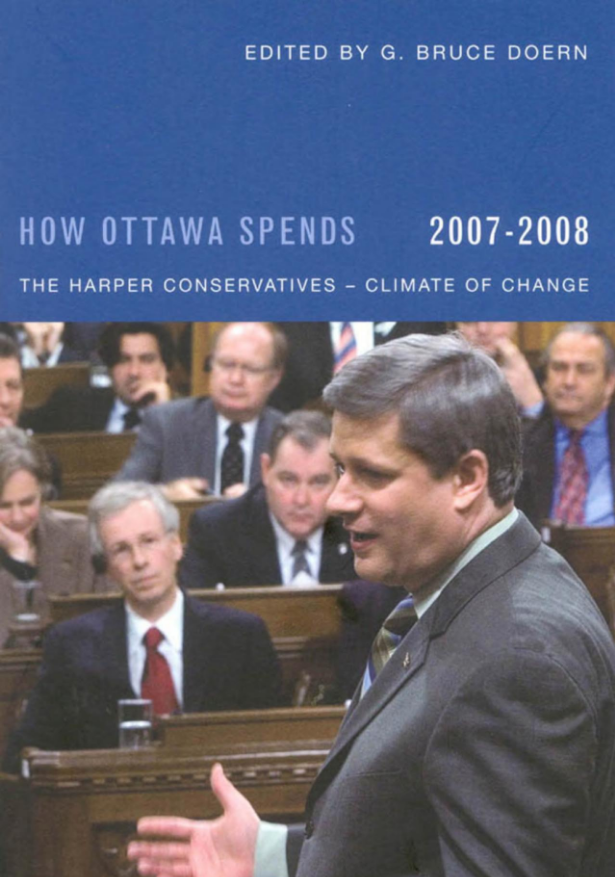
How Ottawa Spends, 2007-2008: The Harper Conservatives – Climate of Change
Edited by G. Bruce Doern
The priorities and policies of the Harper conservatives as they confront a climate of change both politically and environmentally.
In the twenty-eighth edition of How Ottawa Spends, leading Canadian scholars examine the Harper government agenda in the context of Stéphane Dion’s election as Liberal opposition leader and the emergence of climate change as a dominant political and policy issue.
This volume focuses on Quebec-Canada relations and federal-provincial fiscal imbalance. Contributors explore several key policy and expenditure issues, including Canada-U.S. relations, the Federal Accountability Act, energy policy, health care, child care, crime and punishment, consumer policy, and public service labour relations. They also offer a critical analysis of the challenges to overall governance, including ministerial responsibility, public-private partnerships, and the handling of long-term spending commitments inherited by succeeding governments.
Contributors include Timothy Barkiw (Ryerson), Gerard Boychuk (Waterloo), Keith Brownsey (Mount Royal College, Calgary), Peter Graefe (McMaster), Geoffrey Hale (Lethbridge), Carey Hill (Western Ontario), Ruth Hubbard (Ottawa), Derek Ireland (PhD student, Carleton), Rachel Laforest (Queen’s), Ian Lee (Carleton), Trevor Lynn (Saskatchewan), Jonathan Malloy (Carleton), Scott Millar (Government of Canada), Gilles Paquet (emeritus, Ottawa), Michael Prince (Victoria), Christopher Stoney (Carleton), Gene Swimmer (Carleton), Katherine Teghtsoonian (Victoria), Andrew Teliszewsky (Ontario Minister of Health Promotion), Lori Turnbull (Dalhousie), and Kernaghan Webb (Ryerson University).
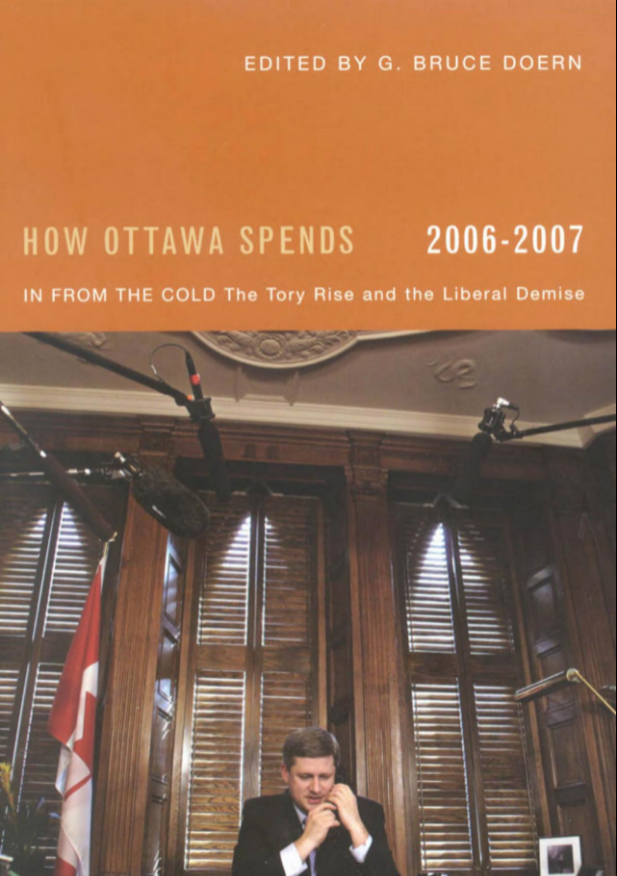
How Ottawa Spends, 2006-2007: In from the Cold: The Tory Rise and the Liberal Demise
Edited by G. Bruce Doern
The priorities of the Harper government analysed in the context of the policies of the defeated Liberal minority government.
In the twenty-seventh edition of How Ottawa Spends, leading Canadian scholars examine the Tory agenda in relation to the changing dynamics of a resurgent Western Canadian power base, Quebec-Canada relations, Canada-U.S. tensions, and key Martin policies.
Contributors explore the challenges that have been created by unsustainable promises made by both major parties on expenditures and growth. They also look at the thorny issues of federal procurement policy and ethics, fiscal policy, energy policy, equalization and energy revenues, cancer control, patent policy and access to emergency medicines, the regulation of tobacco, gambling, and alcohol, and efforts to review spending.
Contributors include Barbara Allen (Birmingham and Carleton), Malcolm Bird (Carleton), Keith Brownsey (Mount Royal College), Bruce Doern (Carleton and Exeter), Geoffrey Hale (Lethbridge), John Langford (Victoria), Evert Lindquist (Victoria), Lisa Mills (Carleton), Tanya Neima (Carleton), Andre Plourde (Alberta), Michael Prince (Victoria), Andrea Rounce (Carleton), Christopher Stoney (Carleton), Allan Tupper (British Columbia), and Ashley Weber (Carleton).
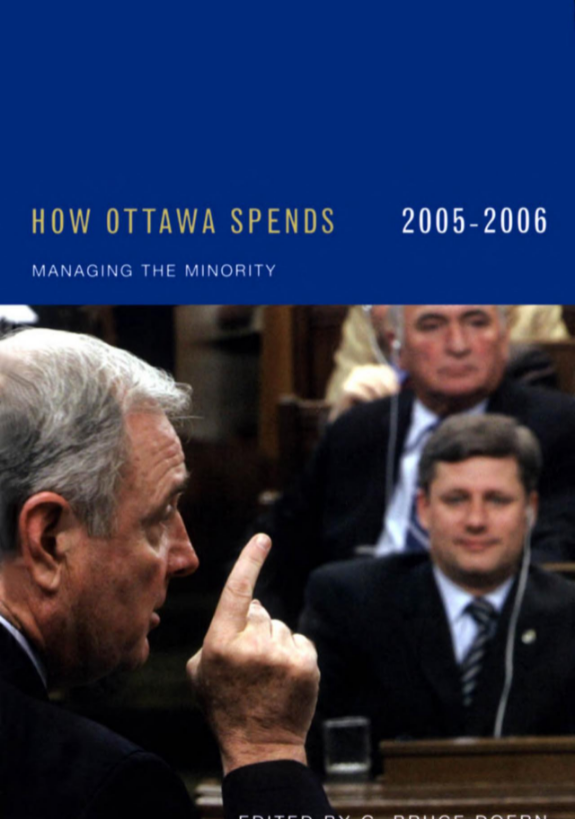
How Ottawa Spends, 2005-2006: Managing the Minority
Edited by G. Bruce Doern
Leading Canadian academics assess the Martin cabinet and the political dilemmas of managing the first minority government since 1979.
The twenty-sixth edition of How Ottawa Spends examines the policy initiatives, priorities, and initial spending of Martin’s Liberals in an era where a political coronation seemed inevitable but high expectations had to be managed downwards almost immediately. Carleton University’s School of Public Policy and Public Administration’s annual study focuses on key issues, including Canada-US cross-border relations, health care reform, public safety and security, and the role of public inquiries. A less-than-buoyant fiscal surplus, escalating concerns about Liberal Party ethics and corruption, and a growing volatility in public opinion are examined, as are Canadians’ increasingly uncertain views about the new leadership, particularly after a ten-year hold on power by the Liberal Party.
Contributors include Frances Abele (Carleton University), Barbara Allen (University of Birmingham and Carleton University), Gerry Baier (University of British Columbia), Herman Bakvis (Dalhousie University), Gerry Boychuk (University of Waterloo), Douglas Brown (Queen’s University), John Chenier (ARC Publications and the Lobby Monitor), Michael Dewing (Library of Parliament), Monica Gattinger (University of Ottawa), Geoffrey Hale (University of Lethbridge), Ian Hodges (Carleton University), Rachel Laforest (Queen’s University), Russell Lapointe (Carleton University), Allan Maslove (Carleton University), Michael Prince (University of Victoria), Jack Stillborn (Library of Parliament), Christopher Stoney (Carleton University), and Reg Whitaker (University of Victoria).
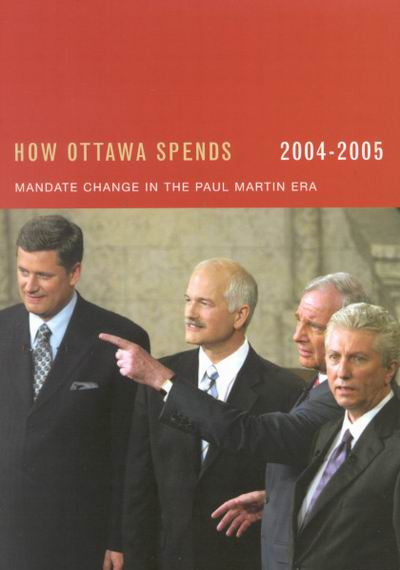
How Ottawa Spends, 2004-2005: Mandate Change and Continuity in the Paul Martin Era
Edited by G. Bruce Doern
A critical assessment of the priorities, spending, and policy initiatives of the new Paul Martin era in key areas of national debate.
The twenty-fifth edition of “How Ottawa Spends” assesses the priorities, initial spending, and policy initiatives of the new Paul Martin era. Writing in the context of the Liberal Party’s internal regime change and the formation of a new Conservative Party, contributors to this volume examine key issues of Canadian national politics and policy, including Canada-U.S. relations; the cities agenda; social policy, ethics and public trust; policies on children, energy, sustainable development policy and implementing the Kyoto Protocol; smart regulation and natural resources; Atlantic Canada fisheries; innovation policy and the services sector; the central agencies and governing from the centre; and next-generation renewal of the federal public service.
Drawing on the work of academics and other experts from across Canada, Carleton University’s School of Public Policy and Administration’s annual book takes a focused and robust look at an era where a political coronation seemed inevitable but high expectations had to be managed downwards almost immediately. A less-than-buoyant fiscal surplus, escalating concerns about liberal ethics and corruption, and a growing volatility in public opinion are examined as are Canadians’ increasingly uncertain views about the new Liberal leadership versus the old Liberal Party’s ten-year hold on power. A new Conservative Party and a suddenly feisty New Democratic Party are also a central part of the new 2004-2005 Canadian political and policy milieu.
Contributors include Andrew Bjorn (University of Washington), Neil Bradford (University of Western Ontario), Tyler Chamberlin (University of Ottawa), Ian Clark (Council of Ontario Universities), John de la Mothe (University of Ottawa), Bruce Doern, Carey Frey (Carleton University), Michael Hart (Carleton University), Luc Juillet (University of Ottawa), Karine Levasseur (Carleton University), Evert Lindquist (University of Victoria), Douglas Macdonald (University of Toronto), Jonathan Malloy (Carleton University), James Mitchell (Sussex Circle), Gilles Paquet (University of Ottawa), Stephanie Paterson (Carleton University), Michael Prince (University of Victoria), Jim Rice (McMaster University), Stephan Schott (Carleton University), Tatyana Teplova (Carleton University), Brian Tomlin (Carleton University), Glen Toner (Carleton University), Debora VanNijnatten (Wilfred Laurier University), and Mike Wenig (University of Calgary).
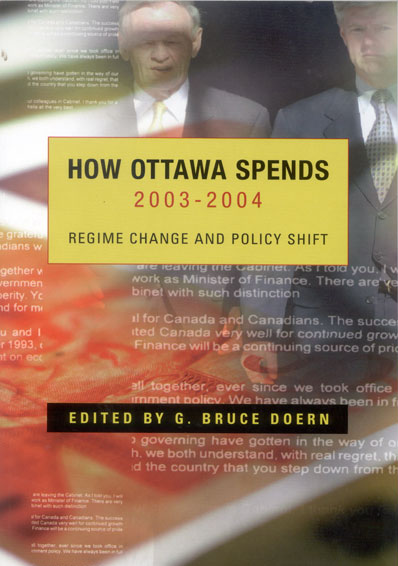
How Ottawa Spends, 2003-2004: Regime Change and Policy Shift
Edited by G. Bruce Doern
How Ottawa Spends, 2003-2004: Regime Change and Policy Shift analyses the political in-fighting of the federal Liberal party and how it has affected public policy development, implementation, and evaluation in Canada.
The 2003-2004 edition of How Ottawa Spends covers a unique period in the Canadian politics, in which Jean Chrétien -barely halfway through his third straight term as prime minister- was urged by many in his party (especially supporters of heir apparent Paul Martin) to take early retirement. Chretien’s refusal to participate in the US-led war in Iraq did nothing to improve his standing with his critics, even though is position was shared by a slim majority of the Canadian public. In this turbulent context of regime change and policy shift, both sides of the House of Commons have shown unusual assertiveness in debates on a wide range of important policy issues.
G.Bruce Doern edits an informed collection of many of those issues: the new national security agenda, North American integration, Kyoto and climate change, health care in the wake of the Kirby and Romanow reports, higher education, the innovation agenda, government policy on science and technology research, pensions, and student financial aid.
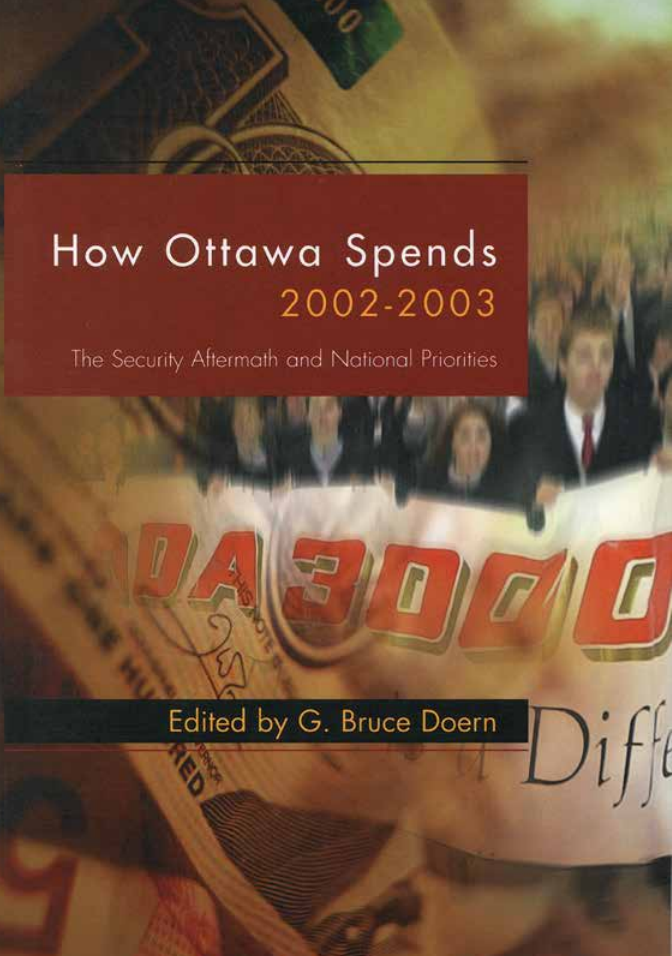
How Ottawa Spends 2002-2003: The Security Aftermath and National Priorities
Edited by G. Bruce Doern
This collection, by some of Canada’s leading political scientists, analyses federal spending policies in light of the events of September 11, 2001. The authors examine current trends in spending and suggest possible future trends given the changed political and economic landscape.
ISBN: 0195417569
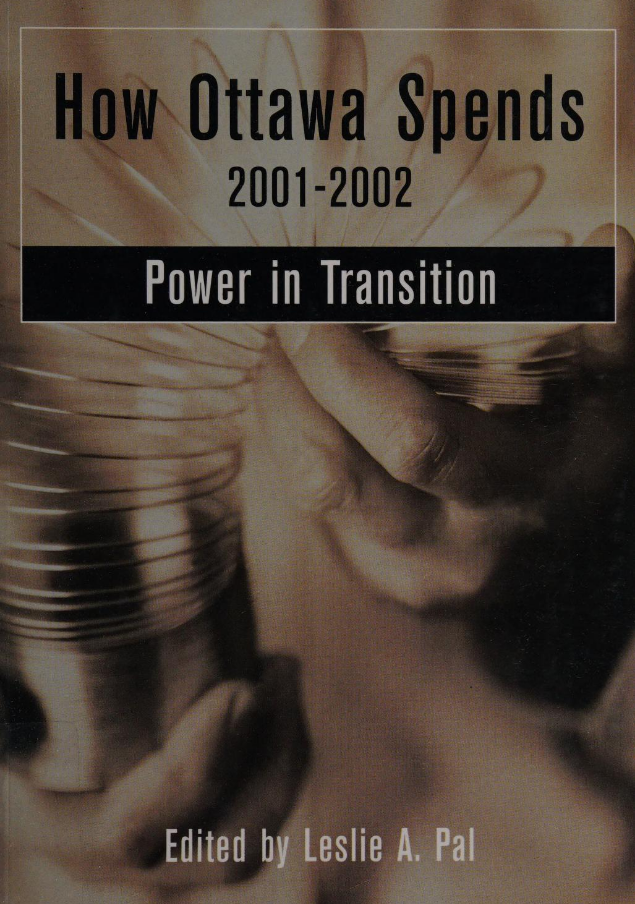
How Ottawa Spends 2001-2002: Power in Transition
Edited by Leslie A. Pal
This edition of How Ottawa Spends examines the evolving Liberal government’s agenda as it moves into its third term in office. The federal election of October 2000 was hardly a campaign of ideas, and the Liberals won it without a clear or detailed platform of policy initiatives. The mini-budget promised substantial tax cuts, but insofar as the Liberals sketched out any priorities, they seemed to imply a shift towards increased spending. As well, in the closing days of their previous government, the Liberals seemed tired and lacking in policy focus. It remains unclear, therefore, how they will shape their new mandate and what continuity it will have with their previous policy directions. This volume probes Ottawa’s evolving agenda with chapters on a variety of economic and social policy topics: the government’s fiscal and management framework, natural resources, regional development, air transportation, the social union, disability, gender equality, the voluntary sector, and the courts.
ISBN: 0195416694
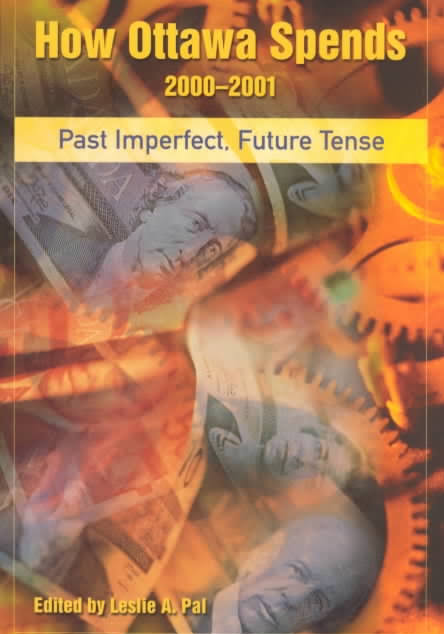
How Ottawa Spends 2000-2001: Past Imperfect, Future Tense
Edited by Leslie A. Pal
How Ottawa Spends 2000-2001 explores the continuing redefinition of the federal government’s role in Canadian governance. After years of deliberate down-sizing and withdrawal, Ottawa now has financial surpluses. As well, the approaching election and the sense that Ottawa must demonstrate its relevance are contributing to a desire for greater activism. Yet there are continued pressures to either stay the course of the first mandate or even go further with tax cuts. The volume analyses these cross-cutting pressures in a variety of key policy areas.
ISBN: 0195415396
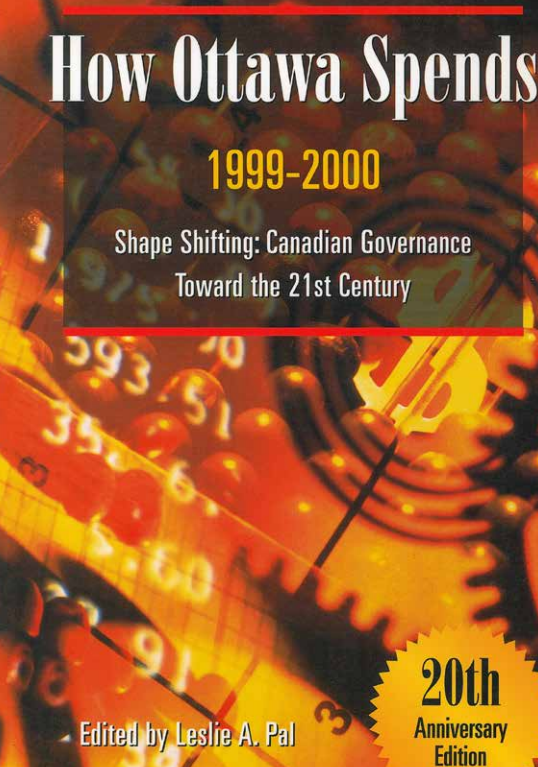
How Ottawa Spends 1999-2000: Shape Shifting: Canadian Governance Toward the 21 Century
Edited by Leslie A. Pal
ISBN: 0195414578
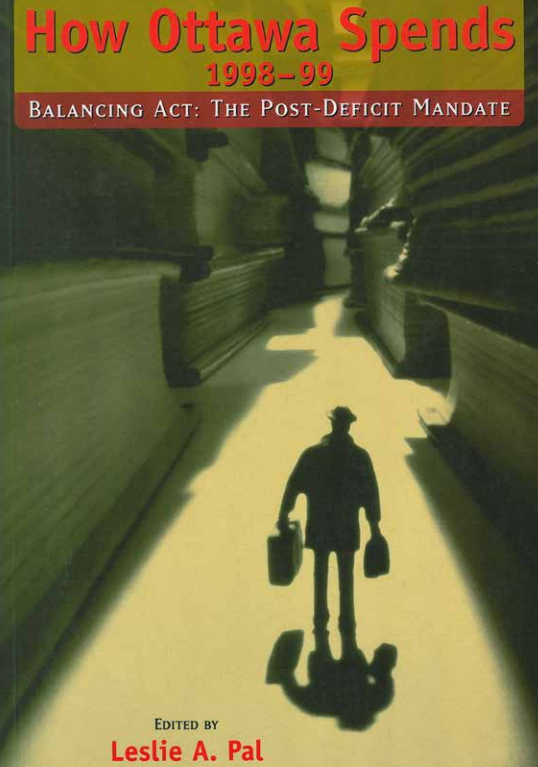
How Ottawa Spends 1998-99: Balancing Act: The Post-Deficit Mandate
Edited by Leslie A. Pal
ISBN: 0195414071
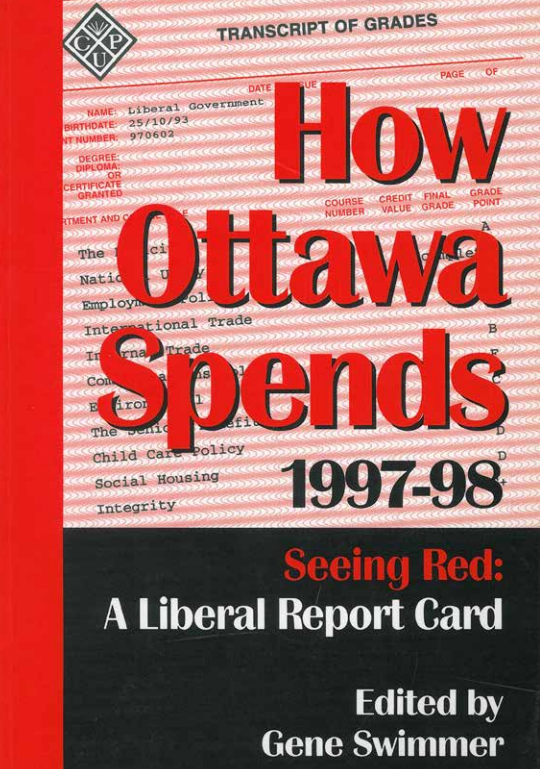
How Ottawa Spends 1997-98: Seeing Red: A Liberal Report Card
Edited by Gene Swimmer
During the 1993 Federal election, the Liberals produced a document, known as the Red Book, which provided a detailed blueprint for how the party would govern, if elected. Jean Chrétien often stated that the promises were put in writing so the public would be better able to hold his government accountable. Three years into their mandate, the Liberals issued a self-assessment of their record which indicates that 78 percent of the 197 Red Book commitments have been fulfilled and another 12 percent are in progress. What constitutes living up to a promise is debatable as the opposition parties estimate that the Liberals have fulfilled only 25 percent of their promises.
In this volume eleven areas of government policy are analysed, including economic management (deficit control, trade promotion and employment), national unity social policies (childcare, elderly benefits and housing) and ethics. Overall, Liberal policies bear a much stronger resemblance to Tory Blue philosophy than their own Red Book.
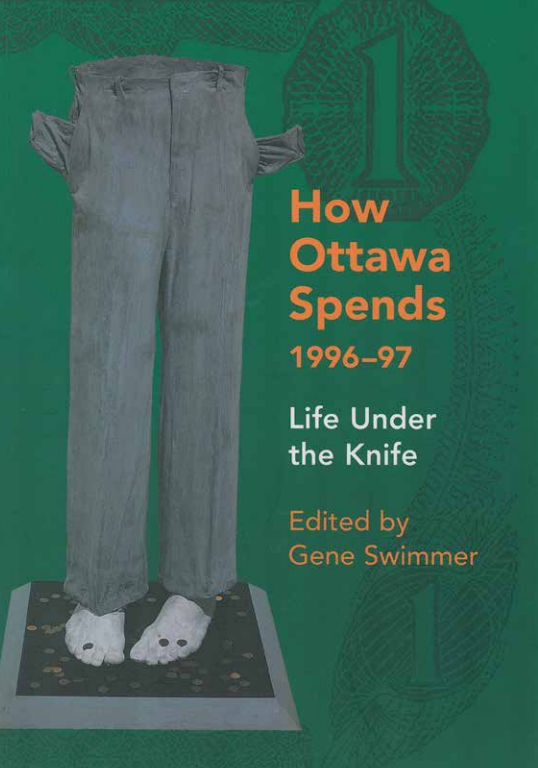
How Ottawa Spends 1996-97: Life Under the Knife
Edited by Gene Swimmer
The Liberal government’s assault on the deficit will reduce program spending by 21 percent by 1998/99 and be accompanied by a reduction of almost 50,000 public employees. Rather than a frantic across-the-board slashing exercise, the cuts have been portrayed as a change in philosophy toward reducing the role of the federal government by devolving responsibilities to other sectors and applying private sector management techniques to those activities that remain. This year’s edition focuses on life in Canada – from the perspective of specific government departments, the Liberal government and society as a whole – now that the federal budget cutting knife is being wielded in an unprecedented manner. Have the restraint measures been like a scalpel, surgically removing unnecessary fat from various government departments, or more like a chain saw cutting a wide swath through its core? Individual chapters analyse the impact of restraint on the departments of industry, environment, human resources development, treasury board, government services and public works, and defence.
ISBN: 0773595899
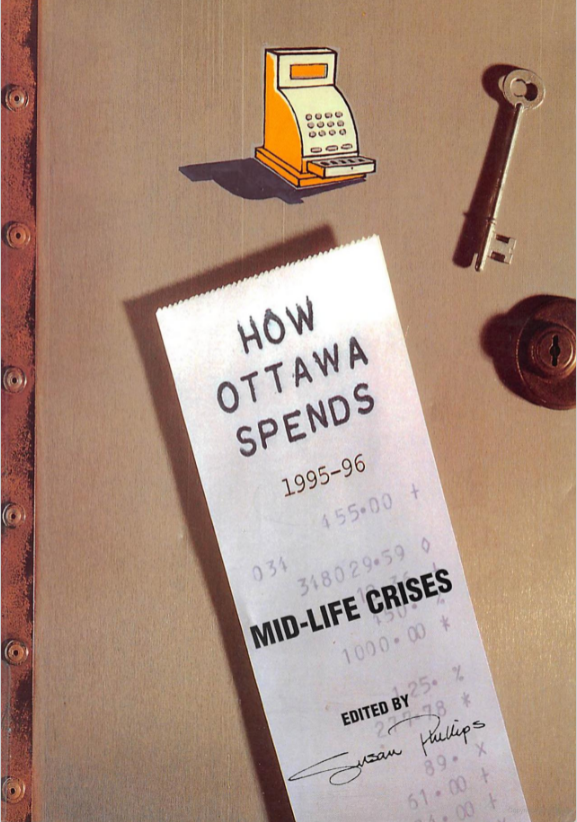
How Ottawa Spends 1995-96: Mid-Life Crises
Edited by Susan D. Phillips
This is the sixteenth edition of How Ottawa Spends. Our objective in producing this annual series is to provide timely and constructive analysis of federal government spending and public policy, and to stimulate debate about policy options. This year’s edition assesses how the Liberals are doing at mid-life. To what extent have they been able to live up to their election promises made in the Red Book? What are the possibilities that they will be able to meet these commitments, given the serious economic and political constraints on governing?
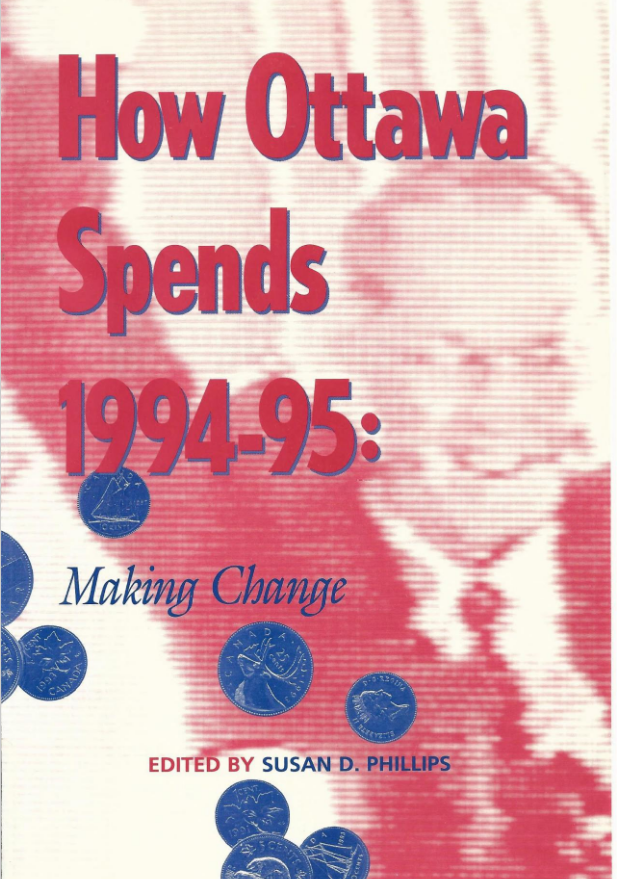
How Ottawa Spends 1994-95: Making Change
Edited by Susan D. Phillips
What are the possibilities for real innovation under the new Liberal regime? Where do ideas for new policy come from? How will the government find the money to implement new policy in an era of strict fiscal limits? Making Change addresses these questions in this, the fifteenth annual review of government spending and public policy from the Carleton University School of Public Administration. It explores the source of ideas and considers the factors which help or hinder innovation in policy and the process of governing.
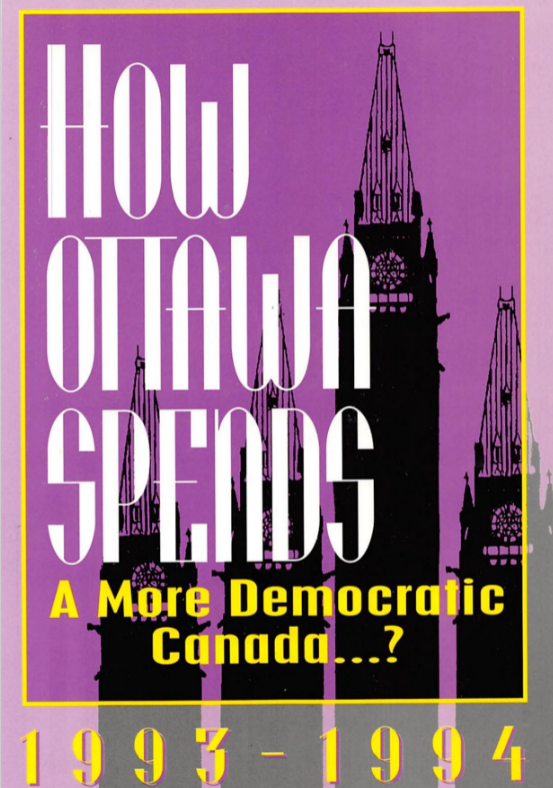
How Ottawa Spends 1993-94: A More Democratic Canada…?
Edited by Susan D. Phillips
An exploration of state records and the forgotten people of Upper Canada.
In Duty Bound is an unprecedented look at Upper Canada’s forgotten people and the ways in which their lives were by necessity bound in a mutual relationship of duty and obligation to the Upper Canadian state.
This neglected area of Canada’s history has been preserved, in part, in the form of personal petitions submitted to the lieutenant-governor and legislature for land, government jobs, pensions, pardons and the lessening of court sentences, for compensation for damages done by, or work done for, the state, and for relief. Using these and other previously unexamined government records, J.K. Johnson illustrates that, popular knowledge aside, Upper Canada was not simply a land of self-sufficient farmers and artisans and that many had to turn to and rely on the state for their livelihoods.
The major themes of Upper Canada’s history, from war and rebellion to immigration and settlement, are well-documented. In Duty Bound fleshes out the lives of ordinary people in Upper Canada and clarifies how several branches of government worked for, or against, the interests of the population.
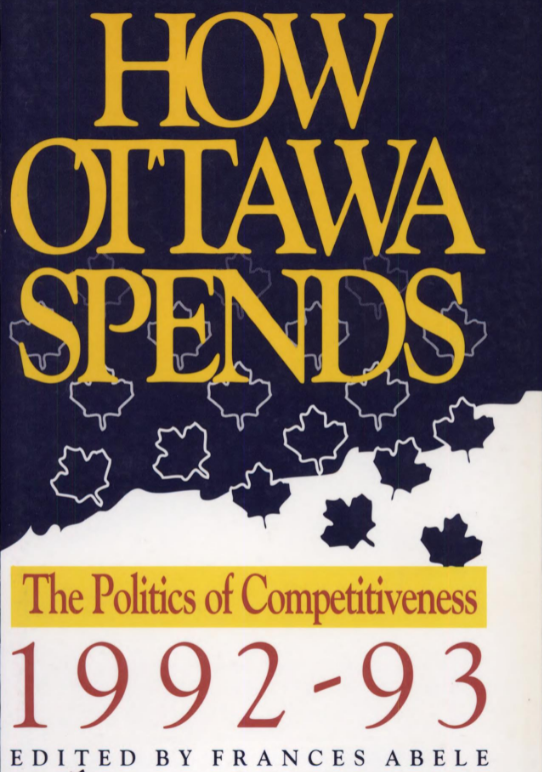
How Ottawa Spends 1992-93: The Politics of Competitiveness
Edited by Frances Abele
An exploration of state records and the forgotten people of Upper Canada.
In Duty Bound is an unprecedented look at Upper Canada’s forgotten people and the ways in which their lives were by necessity bound in a mutual relationship of duty and obligation to the Upper Canadian state.
This neglected area of Canada’s history has been preserved, in part, in the form of personal petitions submitted to the lieutenant-governor and legislature for land, government jobs, pensions, pardons and the lessening of court sentences, for compensation for damages done by, or work done for, the state, and for relief. Using these and other previously unexamined government records, J.K. Johnson illustrates that, popular knowledge aside, Upper Canada was not simply a land of self-sufficient farmers and artisans and that many had to turn to and rely on the state for their livelihoods.
The major themes of Upper Canada’s history, from war and rebellion to immigration and settlement, are well-documented. In Duty Bound fleshes out the lives of ordinary people in Upper Canada and clarifies how several branches of government worked for, or against, the interests of the population.
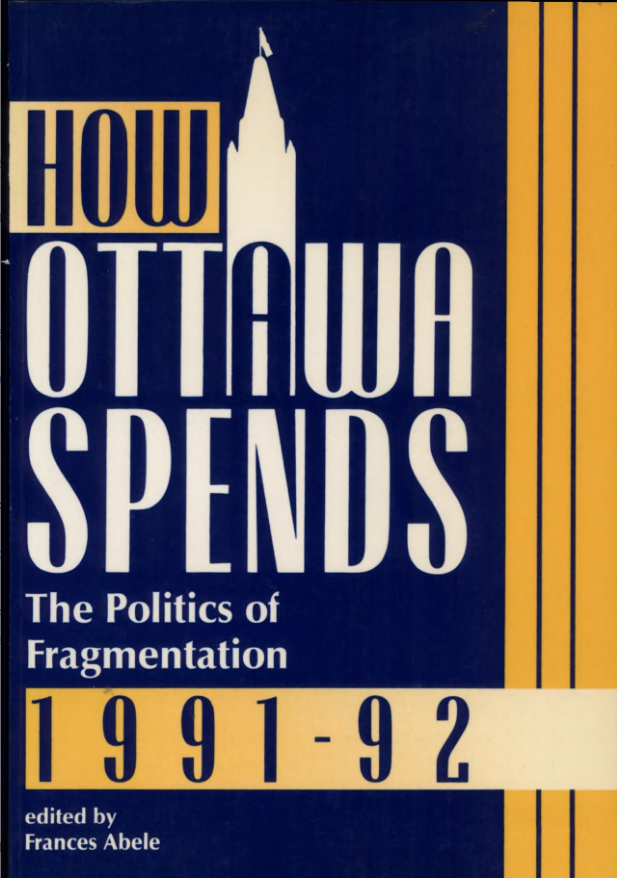
How Ottawa Spends 1991-92: The Politics of Fragmentation
Edited by Frances Abele
This volume is the twelfth in the series on federal government spending and policy performance compiled by Carleton University’s School of Public Administration. This edition assesses the future of Canada in the post-Meech, post-free trade era. Four articles concentrate on the increasing fragmentation of Canada after the failure of the Meech Lake Accord, and each of the others ponders various topics in the context of an era when the nature of the federation seems very much in questions.
Authors from western Canada, the Atlantic region and Quebec explore the changing political landscapes in their areas, while others consider the shifting realities in aboriginal-state relations. Abortion, race relations, federal grants to interest groups, benefits to the elderly, and telecommunications policy are all reviewed as aspects of the “mature” agenda of the Progressive Conservative party in power. Taken as a group, these articles provide a multifaceted and sometimes surprising evaluation of government performance.
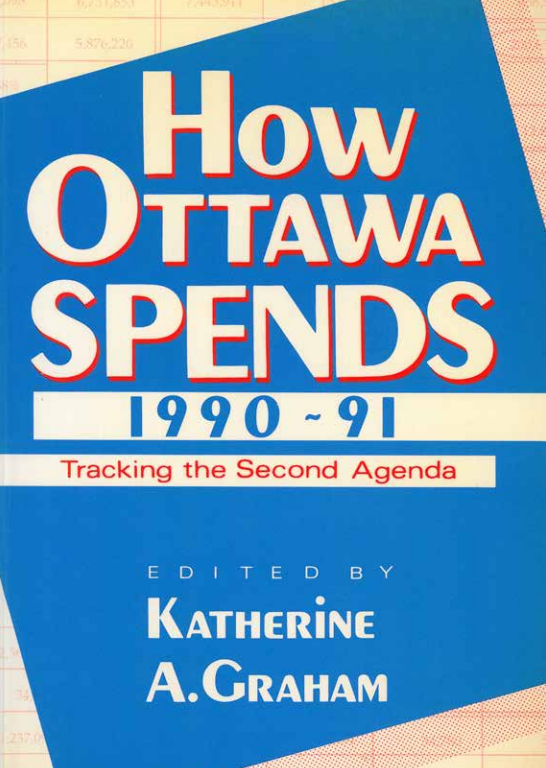
How Ottawa Spends 1990-91: Tracking the Second Agenda
Edited by Katherine A. Graham
An exploration of state records and the forgotten people of Upper Canada.
In Duty Bound is an unprecedented look at Upper Canada’s forgotten people and the ways in which their lives were by necessity bound in a mutual relationship of duty and obligation to the Upper Canadian state.
This neglected area of Canada’s history has been preserved, in part, in the form of personal petitions submitted to the lieutenant-governor and legislature for land, government jobs, pensions, pardons and the lessening of court sentences, for compensation for damages done by, or work done for, the state, and for relief. Using these and other previously unexamined government records, J.K. Johnson illustrates that, popular knowledge aside, Upper Canada was not simply a land of self-sufficient farmers and artisans and that many had to turn to and rely on the state for their livelihoods.
The major themes of Upper Canada’s history, from war and rebellion to immigration and settlement, are well-documented. In Duty Bound fleshes out the lives of ordinary people in Upper Canada and clarifies how several branches of government worked for, or against, the interests of the population.
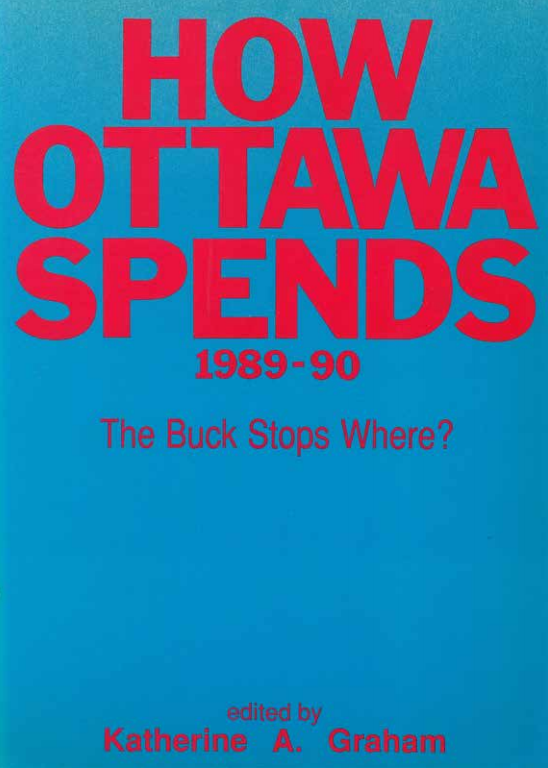
How Ottawa Spends 1989-90: The Buck Stops Where?
Edited by Katherine A. Graham
An exploration of state records and the forgotten people of Upper Canada.
In Duty Bound is an unprecedented look at Upper Canada’s forgotten people and the ways in which their lives were by necessity bound in a mutual relationship of duty and obligation to the Upper Canadian state.
This neglected area of Canada’s history has been preserved, in part, in the form of personal petitions submitted to the lieutenant-governor and legislature for land, government jobs, pensions, pardons and the lessening of court sentences, for compensation for damages done by, or work done for, the state, and for relief. Using these and other previously unexamined government records, J.K. Johnson illustrates that, popular knowledge aside, Upper Canada was not simply a land of self-sufficient farmers and artisans and that many had to turn to and rely on the state for their livelihoods.
The major themes of Upper Canada’s history, from war and rebellion to immigration and settlement, are well-documented. In Duty Bound fleshes out the lives of ordinary people in Upper Canada and clarifies how several branches of government worked for, or against, the interests of the population.
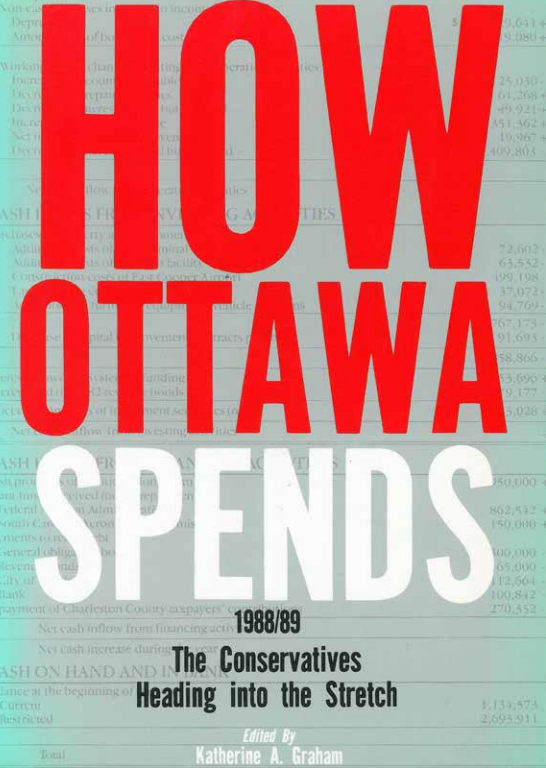
How Ottawa Spends 1988-89: The Conservatives Heading into the Stretch
Edited by Katherine A. Graham
An exploration of state records and the forgotten people of Upper Canada.
In Duty Bound is an unprecedented look at Upper Canada’s forgotten people and the ways in which their lives were by necessity bound in a mutual relationship of duty and obligation to the Upper Canadian state.
This neglected area of Canada’s history has been preserved, in part, in the form of personal petitions submitted to the lieutenant-governor and legislature for land, government jobs, pensions, pardons and the lessening of court sentences, for compensation for damages done by, or work done for, the state, and for relief. Using these and other previously unexamined government records, J.K. Johnson illustrates that, popular knowledge aside, Upper Canada was not simply a land of self-sufficient farmers and artisans and that many had to turn to and rely on the state for their livelihoods.
The major themes of Upper Canada’s history, from war and rebellion to immigration and settlement, are well-documented. In Duty Bound fleshes out the lives of ordinary people in Upper Canada and clarifies how several branches of government worked for, or against, the interests of the population.
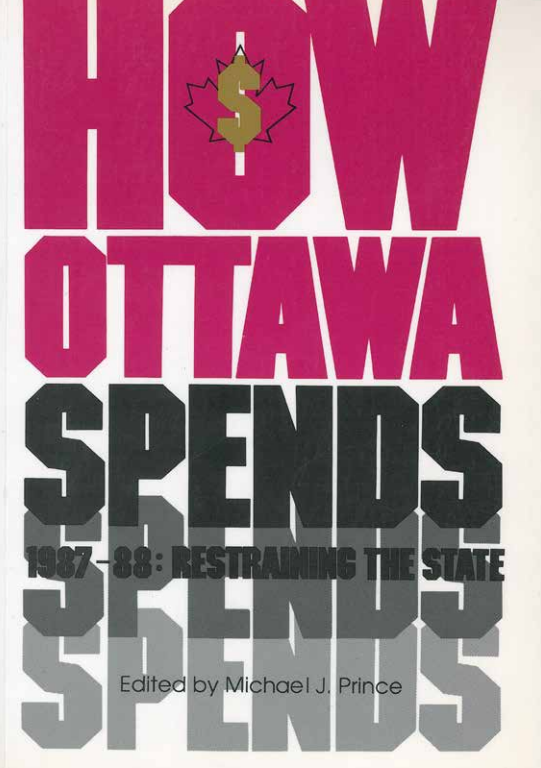
How Ottawa Spends 1987-88: Restraining the State
Edited by Michael J. Prince
ISBN: 9780458807406
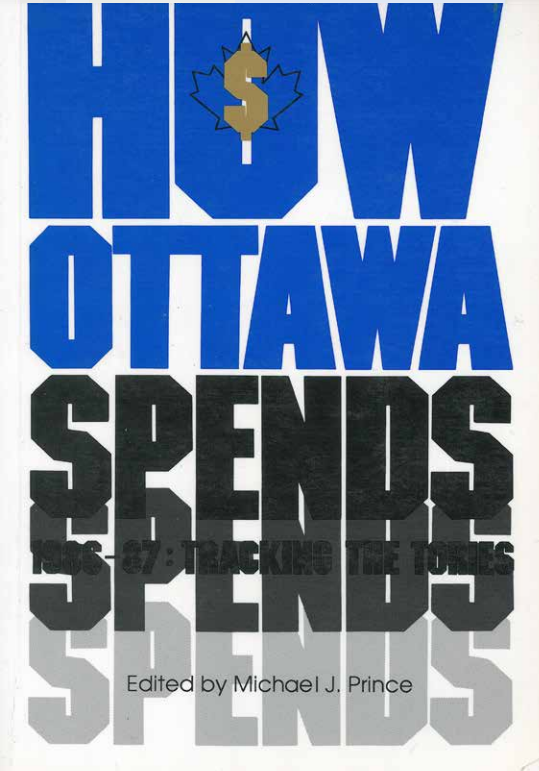
How Ottawa Spends 1986-87: Tracking the Tories
Edited by Michael J. Prince
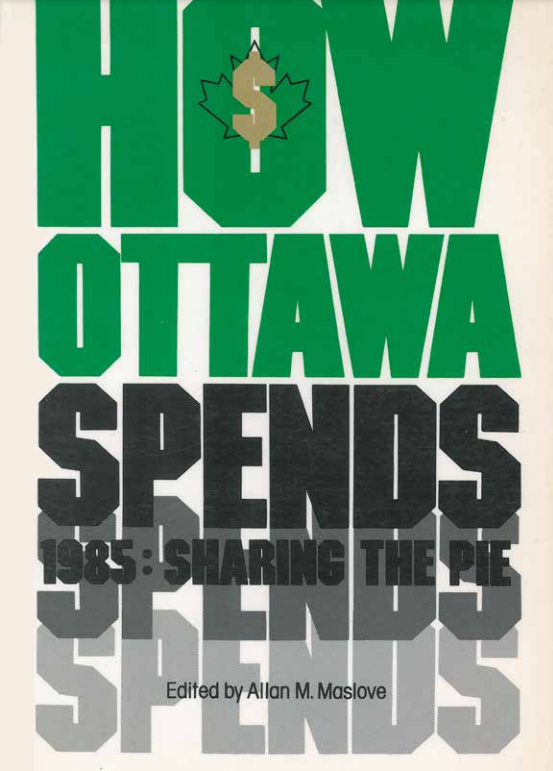
How Ottawa Spends 1985: Sharing the Pie
Edited by Allan M. Maslove
ISBN: 0458991902
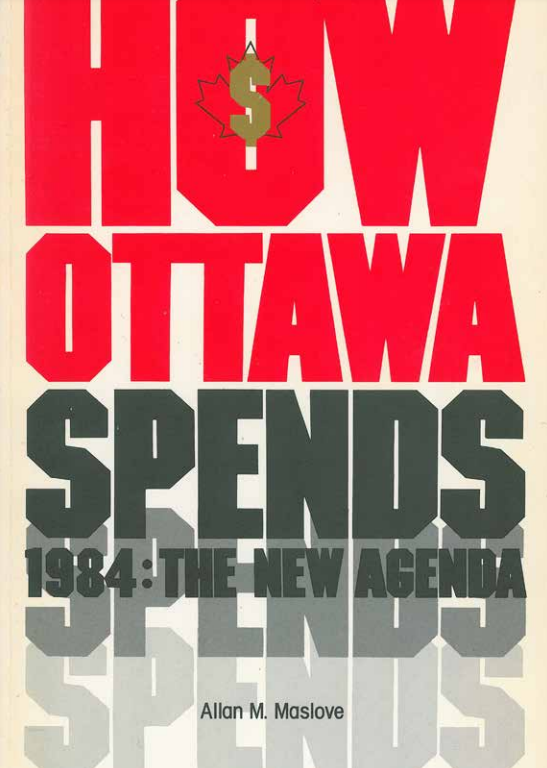
How Ottawa Spends 1984: The New Agenda
Edited by Allan M. Maslove
ISBN: 0458976806
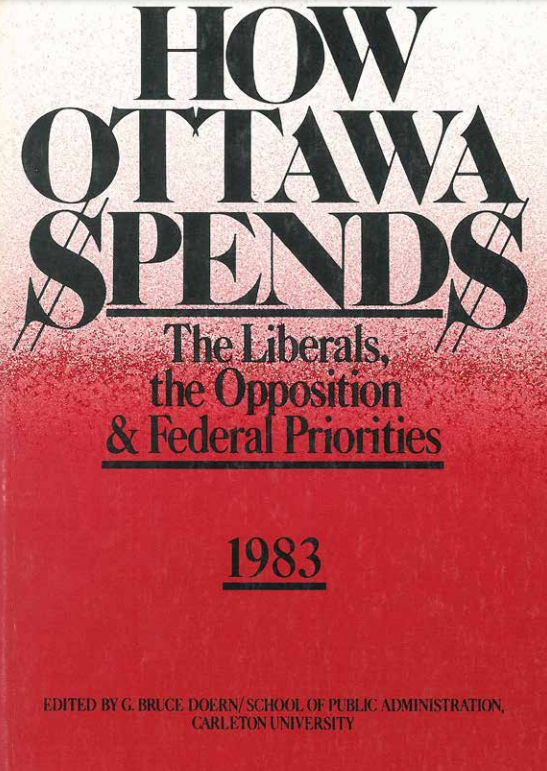
How Ottawa Spends 1983: The Liberals, The Opposition & Federal Priorities
In How Ottawa Spends, some of the country’s top political analysts get inside the byzantine world of federal decision-making, shedding light on the real priorities of the political parties. Among their findings: federal spending cuts do not necessarily “stick”, because affected ministers are often given an offsetting package of funds for different purposes; while Ottawa has become the country’s biggest advertiser (close to $60 million in 1982-83), it has increasing trouble discerning between information and propaganda; because they are afraid of losing their regional blocs of support, none of the federal parties is willing to behave like a truly national party.
Published in 1983, How Ottawa Spends is an eye-opening look at federal spending priorities.
ISBN: 0888626444
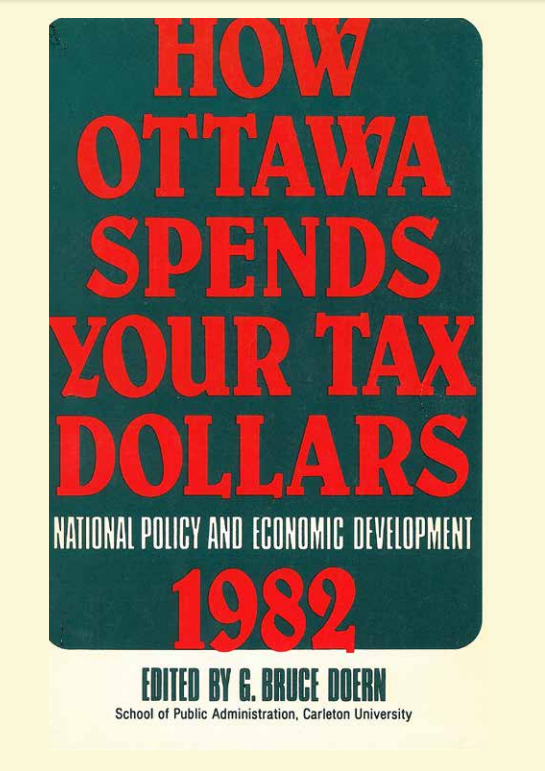
How Ottawa Spends Your Tax Dollars: National Policy and Economic Development 1982
Edited by Bruce Doern
No matter what the politicians say, it’s the way a government decides to spend its money that reveals its true priorities. The authors discuss the underlying policy priorities-and contradictions-that these expenditure proposals reflect and present some interesting insights about the direction in which the Trudeau government was then heading. The 1982 edition of How Ottawa Spends Your Tax Dollars focuses on the federal government’s spending plans for economic development programs.
ISBN: 088862560X
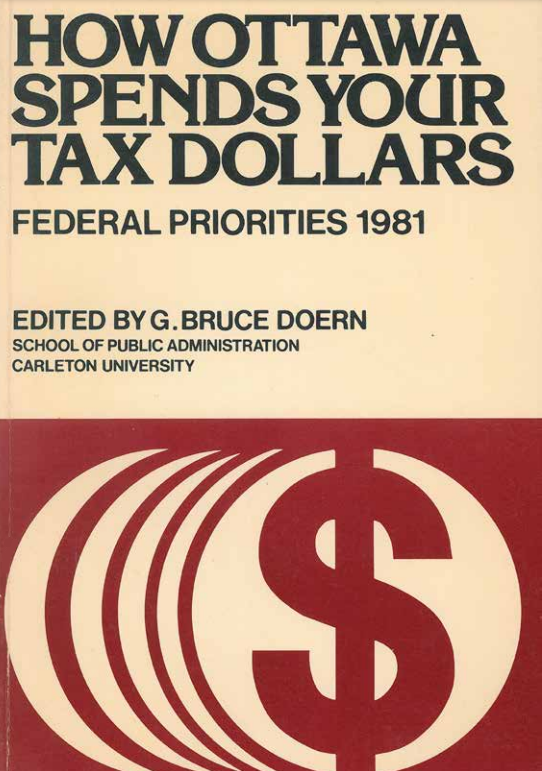
How Ottawa Spends Your Tax Dollars: Federal Priorities 1981
Edited by Bruce Doern
This book probes the politics, economics and management of public expenditure decisions and decision-making processes. It takes a close look at the national priorities that the Trudeau government set for the spending of federal tax dollars – and draws several disturbing conclusions about contemporary policies and priorities. How Ottawa Spends Your Tax Dollars provides in-depth, critical analysis of federal expenditure at a crucial time in the nation’s development.
ISBN: 088862476X
Spending Tax Dollars: Federal Expenditures, 1980-81
Edited by Bruce Doern